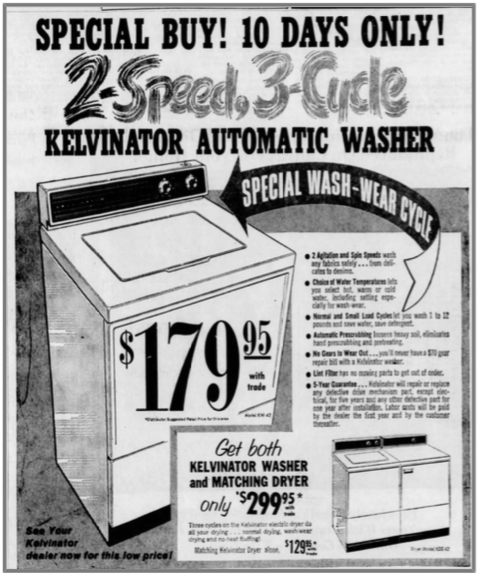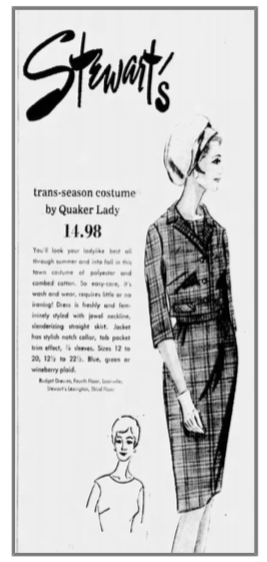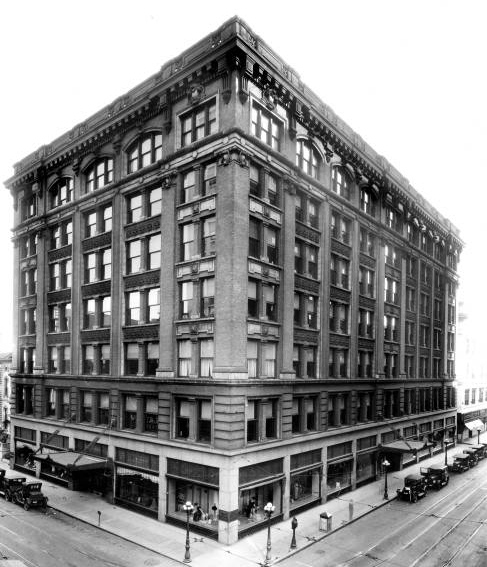By Jim Hopkins
Boulevard Publisher
The last Tuesday in August 1956 was quite like today: A presidential race geared up for the final, post-Labor Day push, amid boiling Mideast tensions and questions about one candidate’s health. Hot and humid, Louisville distracted itself with celebrity news: a very rich New York socialite with a blue-chip name had just married husband No. 3; years later, her son would become a famous TV news anchor dubbed the “Silver Fox.” And contract talks between a major local manufacturer and thousands of employees were the business story of the day. These were the headlines on The Courier-Journal’s front page that Aug. 28, 1956.
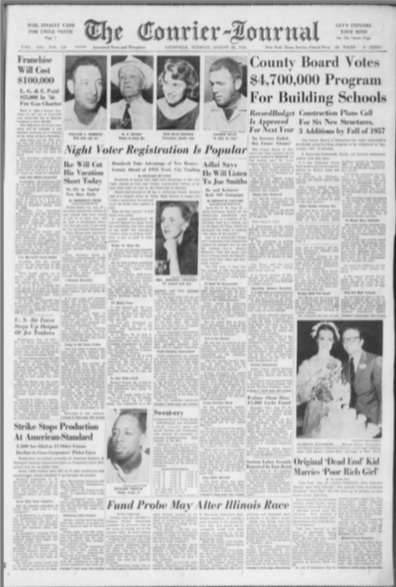
An editor’s playful headline, “Sweat-ery,” summed up what readers should expect that day: temperatures in the 90s, news to make them wince when many employers still didn’t have air conditioning. But the workplace differed in far worse ways.
Companies openly discriminated on the basis of gender and race. The help-wanted classifieds section for women included Curl’s Tavern on Brook Street, offering $30 a week ($265 in today’s dollars) for short-order cooks; applicants had to be white. Kleins Restaurant on Broadway needed a cook, too — but “colored,” adding: “apply at rear.”
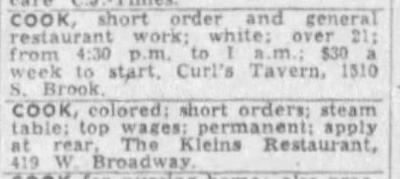
That summer’s presidential race was a rematch between the Republican incumbent Dwight D. Eisenhower, 65, and the long-shot Democratic nominee he’d beaten four years before: Adlai Stevenson, 56, and a former Illinois governor. Their dueling campaigns argued over whether the economy was adding jobs fast enough. But the greater concern was the crisis in Egypt, where new President Gamal Abdel Nasser had just nationalized the Suez Canal.
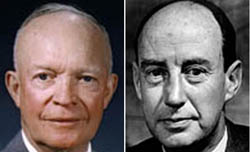
Eisenhower, a retired five-star general, was heading back to Washington after a West Coast golfing vacation in Pebble Beach, Calif., with his wife Mamie; it was a pleasure trip, but also meant to project good health after a heart attack he’d suffered the year before.
The gossipy news? It was about Gloria Vanderbilt, born into one of the nation’s wealthiest families, and still known as the “poor little rich girl” because she’d been the subject of a high-profile custody battle between her mother and an aunt over a $4 million trust fund ($67 million in today’s dollars). She was 10 years old at the time.
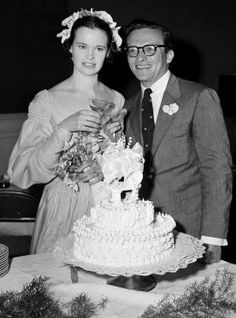
In a photograph on the CJ’s front page, the 32-year-old socialite posed for photographers with her new husband, the director Sidney Lumet; they’d wed the previous day. The marriage lasted 11 years until they divorced, and she married husband No. 4 — her last: Wyatt Emory Cooper. They would have two sons. The second, born when she was 43, was named Anderson Hays Cooper. (Her first son, Carter Vanderbilt Cooper, committed suicide at 23 by jumping from the ledge of the family’s 14th-floor apartment on Manhattan’s posh upper East Side, as Vanderbilt watched in horror, pleading for him to stop.)
The big business news was a strike Continue reading “60 years ago today: a White House race amid Mideast troubles; the future mom of a ‘Silver Fox’ marries (again), and a strike threatens a big Louisville employer”

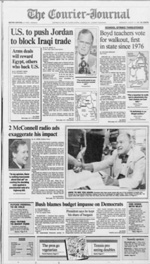

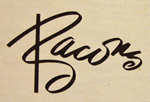 That day’s CJ carried three full-page ads for Louisville-based Bacon’s Department Store, and four full pages of business news, including 2½ pages of stock listings. The Dow Jones Industrial Average had closed the day before at nearly 2,748 points.
That day’s CJ carried three full-page ads for Louisville-based Bacon’s Department Store, and four full pages of business news, including 2½ pages of stock listings. The Dow Jones Industrial Average had closed the day before at nearly 2,748 points.
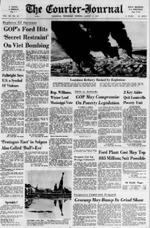
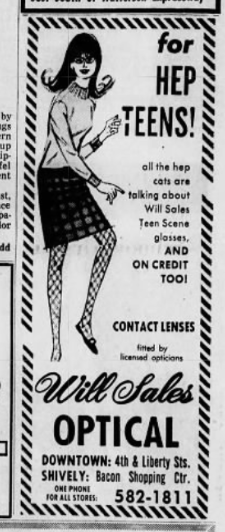
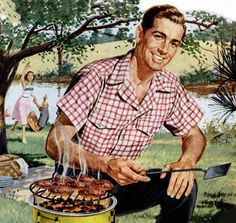
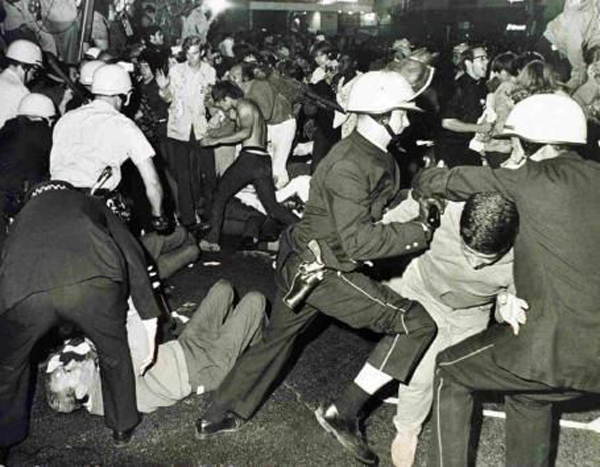
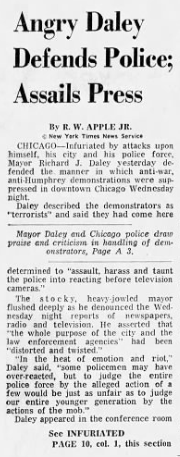 Sound familiar? It should, because that was the scene 48 years ago this summer, when Democrats gathered in Chicago for a convention to pick Vice President
Sound familiar? It should, because that was the scene 48 years ago this summer, when Democrats gathered in Chicago for a convention to pick Vice President 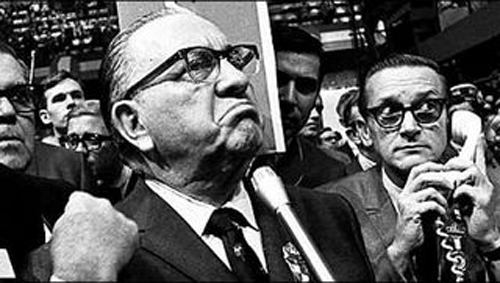
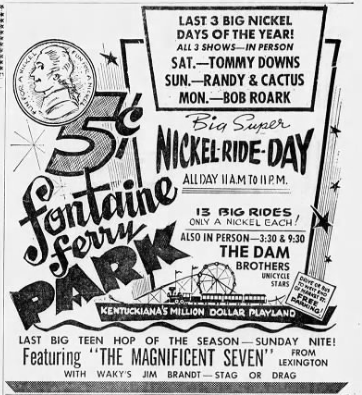
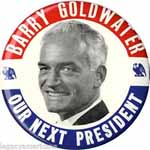 “As many as 23 of the 24 voting delegates may line up behind the Arizona senator on the first ballot Wednesday night,” The Courier-Journal’s Richard Harwood reported on the front page from the convention city of San Francisco.
“As many as 23 of the 24 voting delegates may line up behind the Arizona senator on the first ballot Wednesday night,” The Courier-Journal’s Richard Harwood reported on the front page from the convention city of San Francisco.